Situated on five quiet acres in Keaolani, a neighborhood looming over the town of Kailua-Kona on Hawaii’s Big Island, Three Ring Ranch Exotic Animal Sanctuary is on a mission to protect and educate.
Three Ring is a private animal refuge, and Hawaii’s only fully-accredited and USDA-licensed exotic animal sanctuary. It was founded in 1998 by Drs. Ann and Norm Goody, who set out to rescue as many exotic creatures as possible from abuse or neglect.
Three Ring is entirely volunteer-driven, from grounds work to animal care to financial obligations, relying on symbolic animal adoptions, monetary donations and donations of supplies to continue providing care to animals seeking their best lives in captivity.
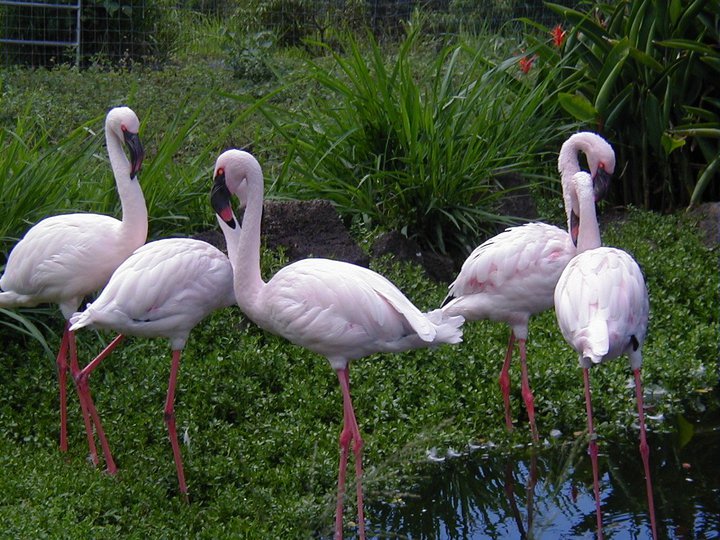
Flamingos are one of the many species residing at Three Ring Ranch in Keaolani. Provided photo.
Goody’s story: Pain, luck and a McDonald’s cup
Dr. Ann Goody is an animal person—more so than just a connoisseur of cat cuddles or an appreciator of cute dogs passing on the sidewalk. She looks beyond the fur and the feathers to see something more in the eyes of the creatures she cares for: fear, love, curiosity, pain, joy.
And yet, Goody never aspired to take off for Kona and oversee the blossoming of a ragtag exotic animal menagerie in the heart of a Hawaiian sector known for lush lawns and high-ticket mansions. In the ‘90s, she was working towards a career in nursing in California when she won a trip to Hawaii in a McDonald’s sweepstakes. The island sent Goody head-over-heels for its breathtaking ecosystems and teeming wildlife, so she sent an essay in for a local magazine content and won a second trip to the island state—this time, a one-way ticket.
The ER nurse met and married Dr. Norm Goody and was working on completing her Ph.D. dissertation and building a new home with her husband when the universe decided to course-correct for her. Forcefully. The Goodys had been married for barely 24 hours when Ann was struck by lightning—which is not a metaphor for newlywed love.
“I remember it being intensely painful, and then nothing,” Goody recalled of the day a bolt lightning coursed through her body, searing its way from the crown of her head into her chest. “It was very disorienting.”
At the time Goody had been unloading coolers in her driveway; it was the day after her wedding reception and seemingly an ordinary day by any accounts. A storm began battering Keaolani and Goody ran out to grab a stick her puppy had left in the lower shared portion of the driveway of the rental house.
The very air was simmering with electricity when Goody turned to walk back towards the residence. She didn’t have time to process that something was wrong before the lightning bolt that had touched down on the other side of a nearby ravine, shot sideways and slammed into the right side of her face. After impact, the bolt shattered and burst outward, setting Goody’s house on fire and taking out a nearby palm tree, transformer and three water pumps before racing up the cable lines to take out everyone’s phones and television sets. The lightning continued in its path of destruction, leaving Goody crumpled in her driveway.
“Our neighbors and Norm thought that I had been shot at, because of the boom,” Goody remembered. “They all came running, and there I was with charred hair, no eyelashes or eyebrows, burns in my mouth and singed all around my face.”
A different type of lightning would have vaporized Goody’s head, so she was fortunate to make it out of the strike alive, but the lightning’s true havoc was being worked internally. A burn mark on the bottom of her left foot indicated where the electricity exited Goody’s body but, like a tornado tearing through a town, the lightning left plenty of damage in its wake. Her heart was in an atrial rhythm, her esophagus had been scarred, her uterus was so damaged it required emergency removal, she suffered multiple musculoskeletal injuries and brain trauma the effects of which are still felt today.
With a hint of dry humor, Goody referred to the strike as the universe’s “idiot slap” that served as a message that she was “doing everything wrong.”
“I was doing the American dream: work hard, make money, buy stuff. That’s the motto, right? That’s the American dream, isn’t it?” Goody’s shake of the head was palpable over the phone. “That’s what I was doing, and I was doing it well.”
It took Goody a year to relearn her husband’s name and to walk again. She recalled one moment of frustration being in a supermarket and seeing something in a glass case that she wanted, but lacking the spatial awareness and control to open the door and get it. As the process of slowly, painfully reclaiming her skills continued, Goody hoped things could return to a semblance of normal, setting her sails back on the path of the American dream, unaware that the universe had targeted her for a cruel game of cat-and-mouse. Enter stage-left: the shark attack in Miloli’i.
The Goodys were snorkeling, celebrating the return of Ann’s strength and coordination. As she kicked blissfully through the water, a tiger shark darted into the scene and took Goody into its jaws—not to eat, but to hurl her out of the water and cartwheeling through the air.
“The reason that I am still here and walking after that attack is because of the lightning,” Goody said. “It changes your magnetic polarity.”
The shark was likely frightened and repulsed by the unusual polarity Goody spoke of, so instead of making her its chew toy, the creature told Goody she’d overstayed her welcome in its ocean.
Was this the universe grabbing Goody by the shoulders again? Probably, she said, but “I still didn’t listen.”
So the universe dropped another A-bomb: the C-word.
“It was the beginning of a year, I had not been feeling right. Starting around Thanksgiving. I had a mammogram, which was clear, but still something felt wrong,” Goody said, recalling how doctors could only pin her symptoms to the lightning strike at first. “Then they did a scan and said ‘oh, you’ve got cancer.’”
Goody was told to prepare for not making it through the year. Her doctor advised her to start writing her thoughts and feelings in a journal for her son because she was not likely to make it to Christmas.
‘Oh no, you didn’t just say that,’ Goody thought on the day she received the diagnosis.
“I thought, ‘we are not doing this. We are just not. I am going to be here for my son to graduate high school, to get married, to live. That’s not going to happen,’” she said. “That was 15 years ago, and I’m still here. Cancer-free.”
Ann Goody is the luckiest person anyone will ever know. If you’re a passenger on a plane with Ann Goody, be sure to sit near her, because if the plane goes down, she will—somehow, someway—walk away from it alive.
Goody quickly realized that wherever greater forces are at play in the world wanted her on this earth for a reason. She just had to find it—and it clearly wasn’t nursing.
Goody forges a new path
It all started with a zebra.
Norm asked his wife on one of her toughest lightning strike recovery days how he could help her feel better, and she responded whimsically that a zebra would do the trick. Turning her joke into a serious endeavor, Norm found a safari park that was closing and disbursing its animals. A former U.S. Fish and Wildlife Service volunteer, Ann Goody was familiar with and licensed to tend to wild animals, so what started as a thoughtful gift from her husband quickly grew into a safe haven for all sorts of creatures as the brutal realities of how they were treated were uncovered.

Three Ring Ranch zebra resident, Patti, enjoys a new mineral block. Provided photo.
Many of the animals from the safari park where the Goodys acquired their first zebra, for example, were shipped out on a barge to be sold for canned hunting (the practice of shooting an animal while it is locked in a cage or contained in a small enclosure). The barge encountered rough waters while trying to dock, so the animals were pushed off the barge into the ocean. Others yet were sold to a local high school to be barbecued at a graduation celebration. In total, roughly 400 animals perished from the safari park closure.
This is morally horrifying to most. Legally, protection of animals in sanctuaries, zoos and safari parks is a gray area. Goody explained that, if she wanted to, she could shut Three Ring down and sell the animals in her care to the highest bidder; their fates could be slaughter, captivity or canned hunting. This is exactly what Goody seeks to protect animals from.
“It is a commercial business, raising animals for canned hunts. People do it in lots of states: raise animals, sell them to people through auction houses, and animals end up in hunting parks in Texas, Oklahoma and Nebraska…all these states that have no restrictions and you can go pay to kill anything. Anything, if you have the money. You can even go shoot a rhinoceros.”
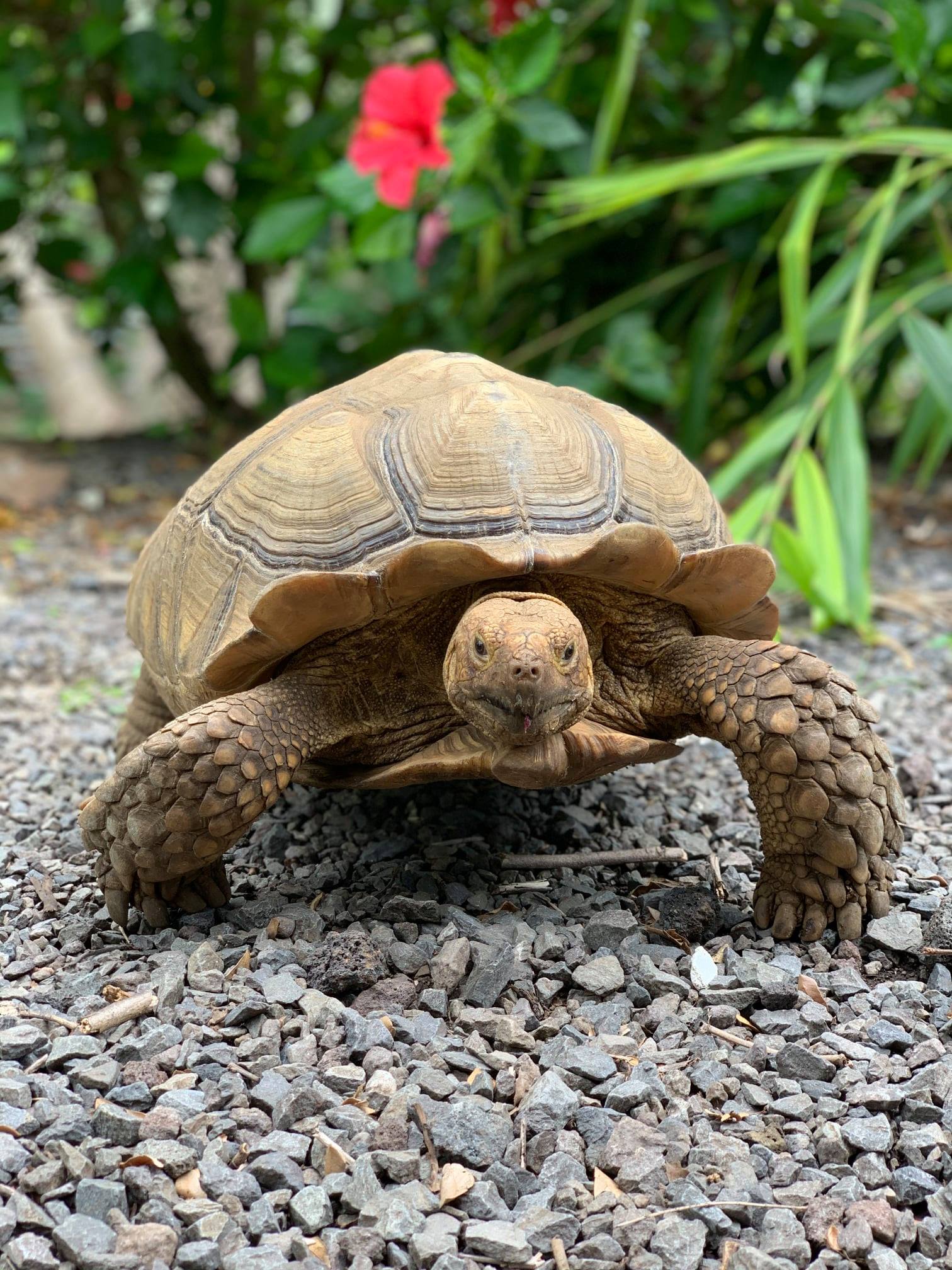
Adam Henry came to Three Ring Ranch as an owner surrender, and was described by them as “the meanest animal.” Now with an acre to roam free, he is one of the sweetest tortoises at 3RR. Provided photo.
The animals that end up at Three Ring have diverse origin stories: zoo or park facilities shutting down, private owners forced to surrender. One of her tortoises, for example, came from a private home where he was kept in a 4-by-4 foot cage. The animals get absorbed into the network of the Association of Sanctuaries or the Global Federation of Animal Sanctuaries, and sanctuaries like Three Ring are contacted to take the animals in, because a life in the wild is not possible for animals bred in captivity.
Parrots are seeking refuge more often than any other animal, Goody said; parrots are not meant to be house pets and should never be kept in cages, and often outlive the people who are holding them captive.
“They live so long, they end up going nuts from what people do to them,” she said.
A miniature animal kingdom
Relaxation is not the vocabulary at Goody's ranch, and the sanctuary is appropriately named to reflect as such: 'Life is a circus,' Goody says, and she may as well be the ring leader. Her day starts at 7 a.m.; here, the morning is welcomed by the squawking and braying of over 80 animals ready for breakfast. Goody is hands-on with the animas all day, and must somewhere find time for all of the administrative work that comes with running a nonprofit. An animal taken in by Three Ring can never live in the wild, even if that is where it came from, so Goody has their whole lifetime—and sometimes hers too, as many animals have lifespans longer than humans'—to get to know them.
Creatures with big personalities come into Goody’s care all of the time—llamas, tortoises, zebras, parrots. Her favorite personality changes often, but it is currently Mo, a lemur who Goody describes with the Hawaiian word tita.
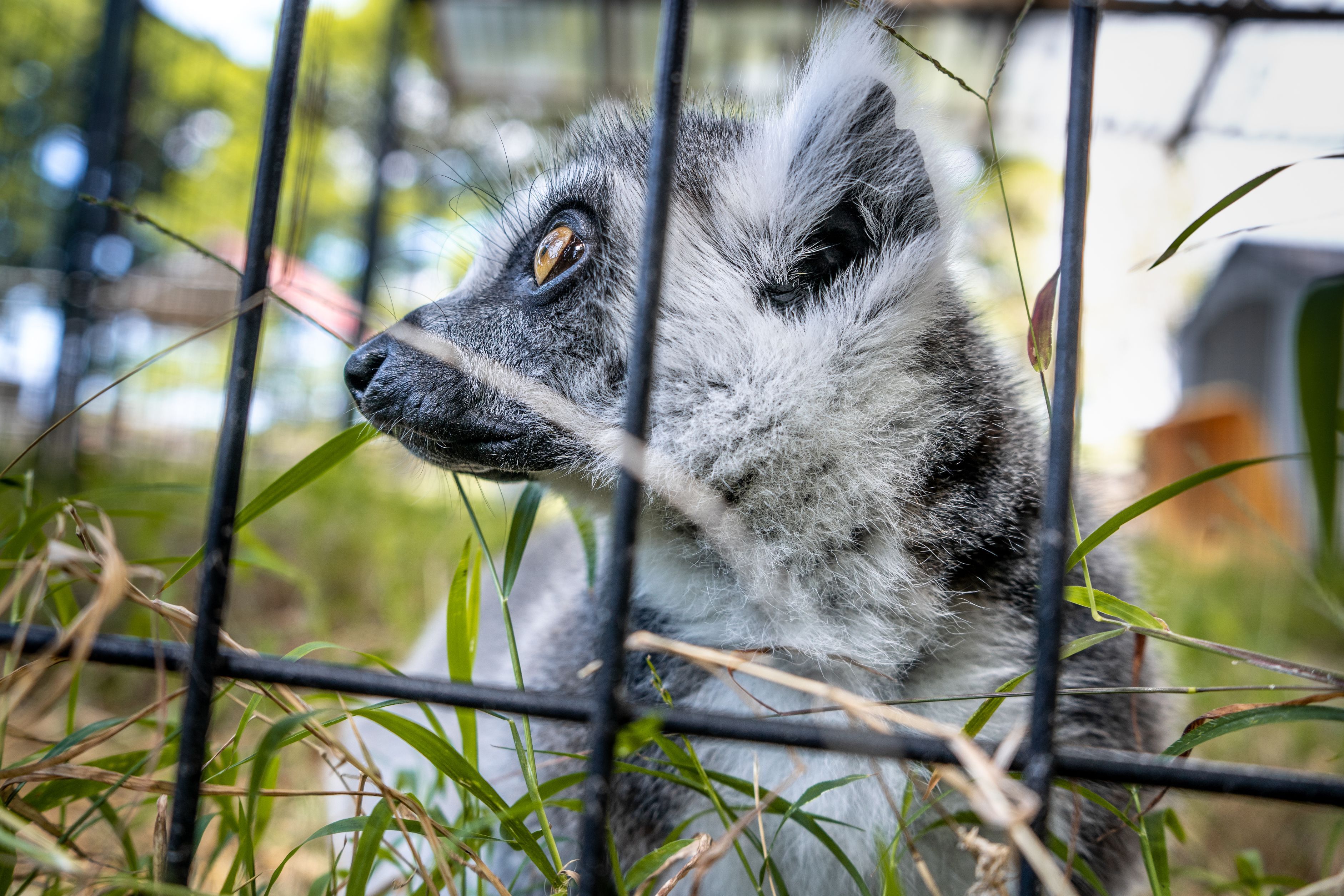 A wide-eyed lemur lost in thought at the Three Ring Ranch. Photo by Three Ring Ranch.
A wide-eyed lemur lost in thought at the Three Ring Ranch. Photo by Three Ring Ranch.
“It means, well, it means she’s a bitch,” Goody laughed. “She’s just a monster. She thinks she’s queen of the world. Lemurs have a matriarchal society, so females are dominant, and Mo thinks she runs the whole planet.”
Also a resident at Three Ring is Kalani the cockatoo, a comedian known to send volunteers into hysterics for her likening to swear words and scolding “bad duck!” outcry when someone is doing something she disapproves of. Goody was once chatting with the cockatoo, who shut its caretaker down by remarking in her most miffed tone that “you have a lot to say.”
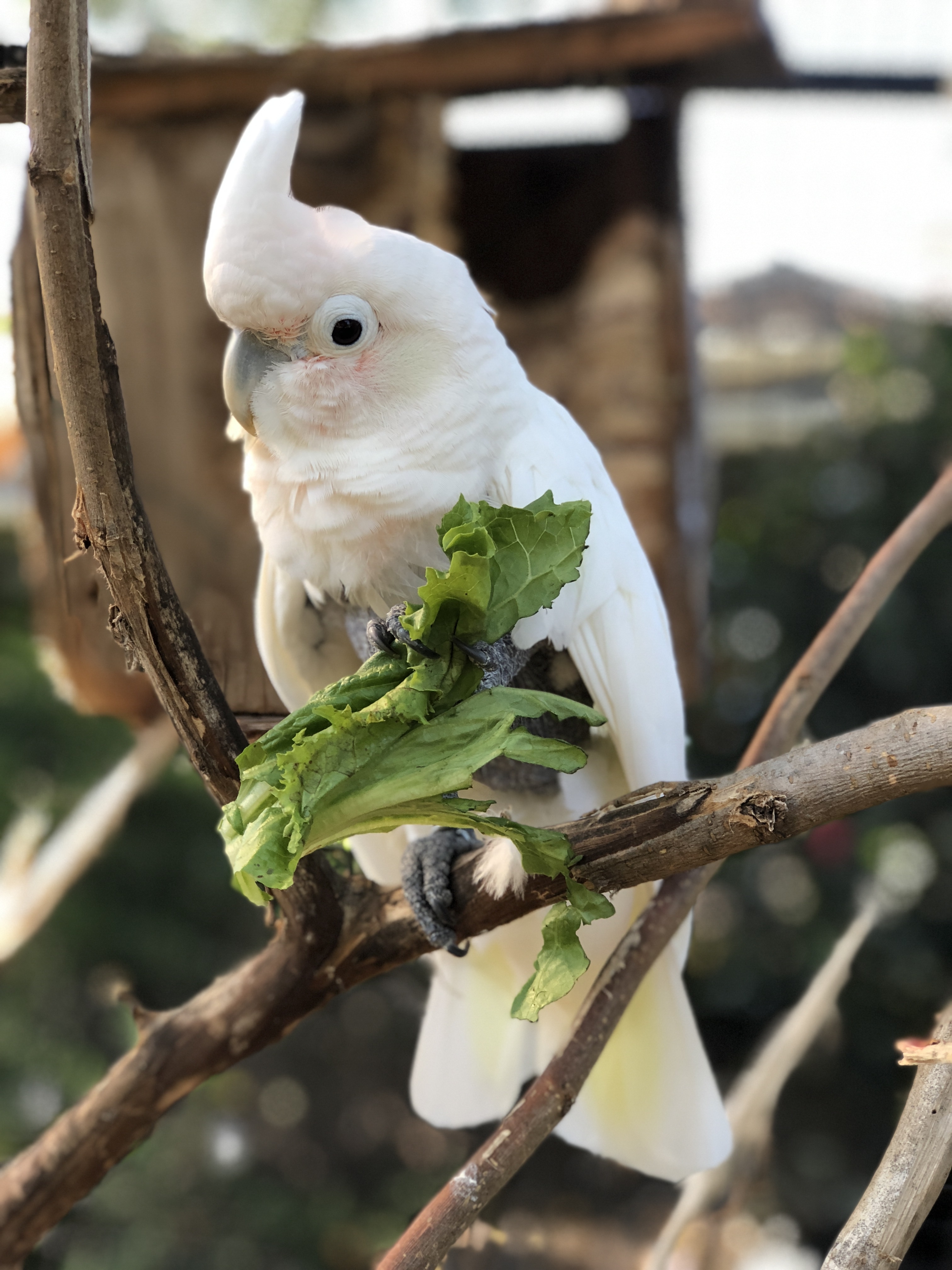
A curious cockatoo, resident of the Three Ring Ranch, glimpses at the camera. Photo by Three Ring Ranch.
On the other hand, Goody deals with animals that are grumpy, ornery, moody, stubborn. One Three Ring guest, an alpaca, would lob a huge spit ball at Goody’s face any time he’s given the chance. The animals are anything from sly, to mischievous, to affectionate, to sassy.
The animals are smart, Goody agreed, but it’s not that simple.
“They’re smart in their own way. As humans, we judge an animal based on our own criteria of what is intelligent,” Goody said. “If we are going to be fair, their criteria of intelligence would be being able to survive where they are native to. [...] We have to stop imposing our own view on an animal and humanly interpret their intelligence when we want to assess their abilities. Scientists and researchers and observers are always aware that we have that bias.”
Goody seeks connection with every animal that comes into her care. It’s often a slow process entirely at the creature’s mercy: Goody, a very small human in stature herself, usually has no option other than to watch the animal from afar until it lets its guard down.
“Anybody can do this, if you just try and look at the world through their point of view and realize that we humans are an arrogant, arrogant species,” Goody said. “And when we come up to an animal, we go to interact with them as we would with another human. We reach our hand out to them, and from their perspective, the hand is a threat. Other than a primate, no other creature on earth has hands and uses them like us. Think like that animal. Give it time.”
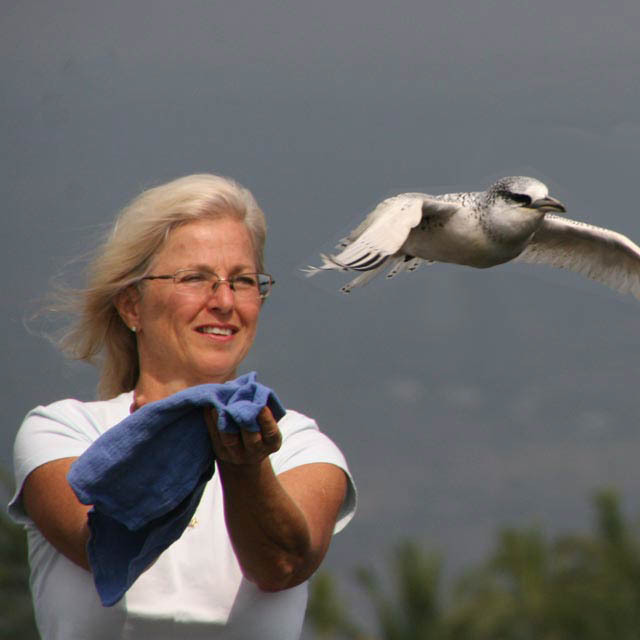
Ann Goody, curator of the Three Ring Ranch, turns loose a tropical bird. The ranch used to rehabilitate native Hawaiian species but now focuses on exotic animals. Photo by Three Ring Ranch.
Education for Hawaii and beyond
When Americans from the continental 48 picture the gorgeous archipelago of Hawaii, blooming flowers, white sandy beaches, and thriving green spaces often come to mind. The island is much more vulnerable than many realize.
“An awful lot of very strange things are going on on our island,” Goody said. “[...] So many of the wild animals on the island are invasive species. It brings the conundrum of, do you save this animal that needs help when it’s invasive? It’s very interesting what is going on right now in Hawaii.”
Those invasive species include mongoose, cats, dogs, goats, pigs, rats, sheep and, well, people. Native bird populations are plummeting because of the invasive animals, but stray cat and dog populations are running rampant because of people adopting animals during the pandemic and later growing bored of or unable to take care of them. Strays are often not fixed and left to reproduce at exponential rates. Fishing and boating gear in the waters surrounding Hawaii kills local marine life through strangulation or ingestion. Tourism is a different beast; Goody says she is not opposed to tourism, but urges visitors to visit more responsibly.
“People who visit Hawaii orphan animals all the time,” Goody explained. Tourists may be on a beach and see a tiny, baby goat running up to humans. These babies are often so young their umbilical cords are still intact; tourists, well-meaning but ignorant, will scoop up the babies they perceive to be orphaned and attempt to place them with an animal rescue agency, not realizing that the baby was intentionally left in that area by its mother so she can go find food.
“This happens every single week, at least once a week. At least one goat, a lamb, a piglet. [...] If people take away one thing from this article, it should be don’t touch it. Whatever it is, leave it alone. Leave the bird on the ground. Leave the baby goat alone. Leave the turtle on the rocks alone, it’s sleeping. If it’s in imminent danger you may gently move it. Go away. It’s nature, it’s supposed to be there, leave it alone. Don’t pick up the rocks or break off pieces of plants. Visit responsibly and enjoy, but leave everything for the next person to do the same.”
Three Ring’s goal with animals is to provide safety. The ranch’s goal with humans is to provide education about their place in the natural world. The ranch offers tours to visitors and volunteer opportunities ,and a chance to learn about the importance of conservation and wildlife protection. In particular, Goody is invested in educating the youth, so that her work can continue when she’s gone.
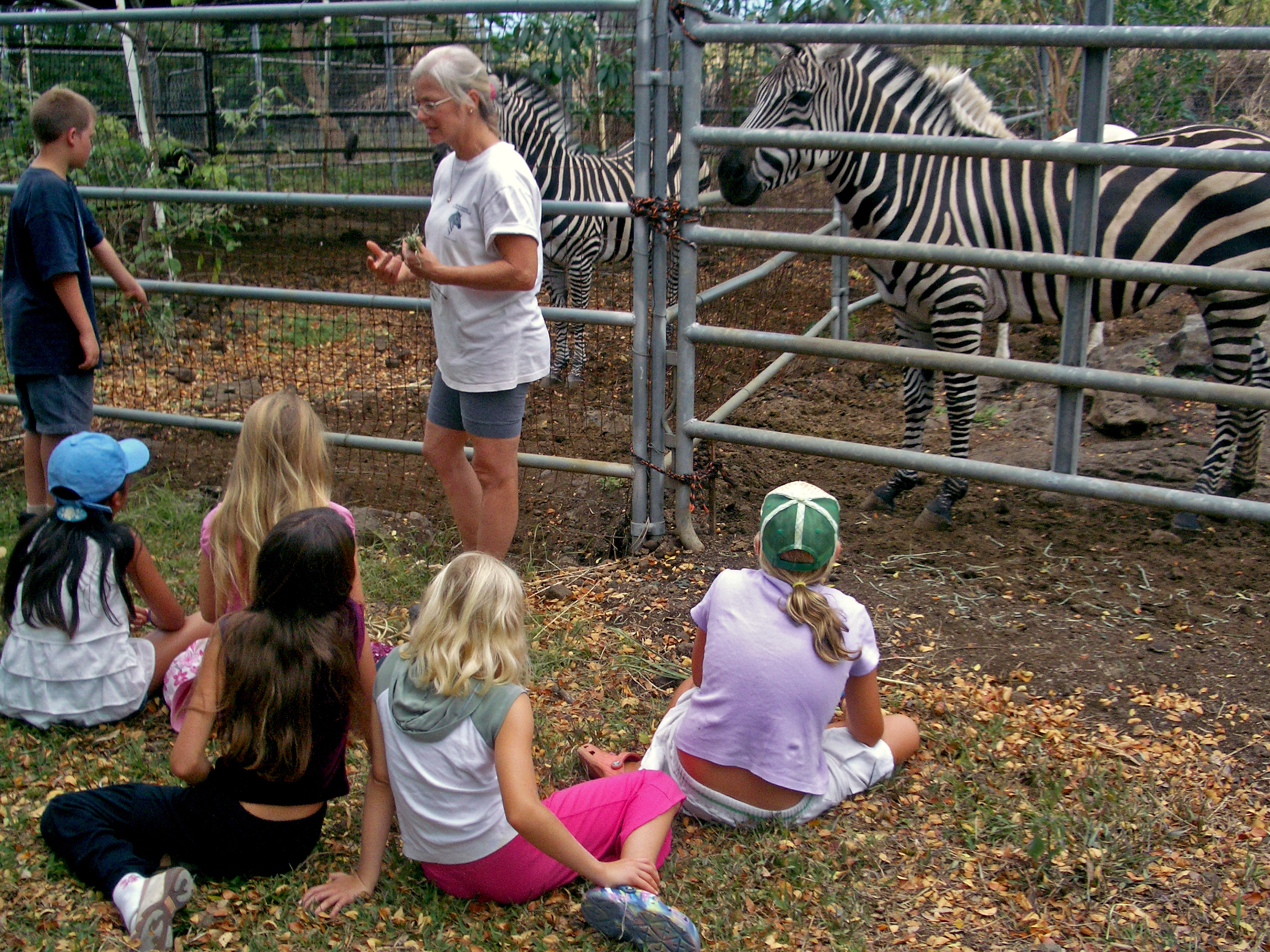
Three Ring Ranch is passionate about educating the youth about the importance of wildlife protection and conservation. Photo by Three Ring Ranch.
“I believe that children, especially in Hawaii, have to learn that they have an impact. The kids that visit go on to become teachers, scientists, lawyers, doctors, nurses… interesting careers yet really respectful human beings.”
The connection between humans and animals is much different than inter-human ones; for example, Goody said, Bill and Melinda Gates have paid many visits to the ranch, but the animals, blind to status, money or power, just see another human extending their hand. Another person to trust or fear, another potential abuser or companion.
Goody’s 12-hour workdays and back-breaking chores if even one visitor out of each batch realizes the importance of her mission. More information about visiting, volunteering at, or donating to Three Ring can be found at threeringranch.org.
“Getting to watch forgiveness in an animal, seeing that they have the capacity to forgive humans for what humans did to them, that's amazing,” Goody said. “Watching them come out of their shells and blossom, and become healthy, happy animals and watching them play. That's incredible, that’s what it’s all about.”
For more information or to make a donation, visit store.threeringranch.org/collections/monetary-donations.
